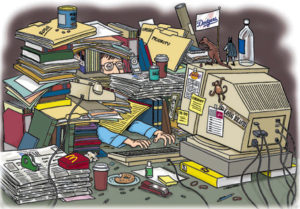
Does anyone else think that their creative process is about as effective as trying to walk on Jell-O? Sure, you can do it, but the trip is precarious, and the outcome is iffy at best.
January is usually a time to reflect on the past year and look forward to a new beginning. Many people make goals without having an actual plan for change, while others simply don’t bother, knowing themselves well enough to understand that writing it down won’t change their daily run to the gas station for a doughnut or a soda. Or both.
I think most of us are good at spotting our big picture goals, but where we stumble is with an actual plan to get from here to there. And once we throw ourselves off the wagon, even just for a moment, the goal is then forever out of reach.
Well, I’m here to offer a different approach. Because why is it that January 1st is the only day we all feel like we should maybe change something in our lives? Or start down a new path? What about, oh I don’t know, tomorrow? Are we allowed to start over tomorrow?
Back to my creative process. I go through spurts. I can write an entire novel in a month, then I have two months where no matter how much I try, it seems that nothing will work. Not creating, not editing, not fixing, not even eating lots of chocolate in order to make everything better. Sometimes even my trusty Diet Coke fails me. I can throw hours and hours at a plotting problem, and I’ll get exactly nowhere. Then, the stars align and suddenly I’m once again a writing machine. Nothing can stand in my way as I masterfully fill all of my plot holes with the perfect puzzle pieces and my novel is a work of art!
And then I go back to the slums of my process to wallow while I take another few weeks to figure out how to fix the one little problem a beta reader pointed out. It’s exhausting, and it makes me feel like a total looser.
Like so many others, I need to be more healthy this year. I said this last year as well, and nothing really happened except me feeling guilty about nothing happening.
I once heard a brilliant mantra that I’m sure this man stole from someone famous. “Nothing changes if nothing changes.”
I’m not going to lose weight if I don’t modify my diet. My writing process isn’t going to get smoother unless I change something. And instead of saying I’m going to put out five books this year, I’m going to take things day by day.
If today fails in the writing department, then I get up and start again tomorrow. I decide to jot down fifteen ways that won’t work with my plot, or ten horrible ways to fix the problem that involve ninja monkeys. My goal is to have a goal each day—something more than “I will fix this!” or maybe get some Sonic for lunch. No, instead I’m going to take a moment each night before I go to bed and decide how I will tackle my problems the next day.
Starting over is difficult under any circumstances, but each day can be a new chance at success. Don’t waste it! Decide tonight how you will approach your problem tomorrow, and at least you will be moving forward, not lying on the treadmill as it unceremoniously dumps you back on the ground at the end of the belt.

 Like most of the authors I know, I’m not a naturally organized person. Sometimes it’s a struggle to force myself to get the major plot points or non-fiction chapters mapped out before I start on a new project. After installing a giant electronic whiteboard I picked up on CraigsList, I was able to see the value of the visual cues and mind-mapping when hashing out a new project.
Like most of the authors I know, I’m not a naturally organized person. Sometimes it’s a struggle to force myself to get the major plot points or non-fiction chapters mapped out before I start on a new project. After installing a giant electronic whiteboard I picked up on CraigsList, I was able to see the value of the visual cues and mind-mapping when hashing out a new project.
